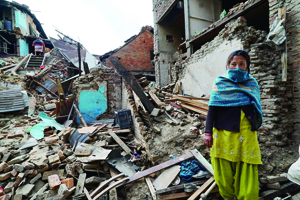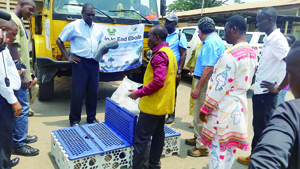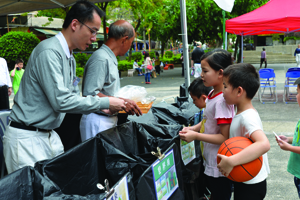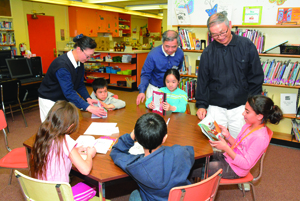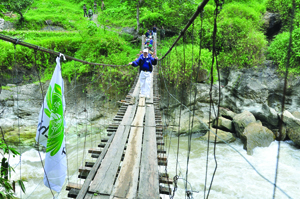

| Tzu Chi Events Around the World | ||||||||||
Nepal An earthquake measuring 7.8 on the Richter scale rocked Nepal on April 25, resulting in horrendous damage. More than 8,800 people perished and over 23,000 were injured. The first Tzu Chi relief team arrived in Nepal on April 28 with one ton of medicine and medical supplies and 200 kilograms (440 pounds) of instant rice. The delegation consisted of 15 members and included four doctors from Tzu Chi hospitals in Taiwan.
The team stayed in Nepal until May 4. The doctors treated the injured while the rest of the team assessed the damage and investigated how Tzu Chi could best help survivors. A total of 1,106 patient visits were served during this period. The medical team used LINE, a messaging app, to send x-ray images to orthopedists in Taiwan. Needed materials to treat broken bones arrived in Nepal with the second Tzu Chi relief team on May 1. Before the first team of Tzu Chi doctors returned to Taiwan on May 4, they gave a lot of medicine and medical supplies to the Bhaktapur municipal health department, Bhaktapur Cancer Hospital, and a tuberculosis and AIDS hospital. Dr. Prakash Raj Neupane, director of Bhaktapur Cancer Hospital, gave each Tzu Chi member a gift khata, a symbol of purity and auspiciousness. Dr. Neupane thanked the medical team from Taiwan, whose members had given a great deal of help to the suffering Nepalese. Dr. Chien Sou-hsin (簡守信), superintendent of Taichung Tzu Chi Hospital, remarked that he was happy to bring love from Taiwan to Nepal. Tzu Chi has sent six relief teams to Nepal as of late May. In addition to providing medical care, volunteers have been distributing aid, providing hot food, and conducting work relief programs. The following is an overview of the aid provided by Tzu Chi from April 28 to May 29: Goods distributed: 12,147 families in Bhaktapur and other areas whose homes totally or partially collapsed have received goods including rice, dals (beans), cooking oil, sugar, and daily necessities. Medical treatment: Tzu Chi doctors served 7,379 patient visits, performed 11 operations, and helped deliver a pair of twins. Hot food: 51,410 meals served. Cash-for-work programs: 2,149 shifts, in which survivors cleaned up streets, cooked meals, set up tents, or helped in distributions Shelters: 60 tents (853 square feet each), 500 family-sized canvas sheets, 500 single-person plastic sheets Emergency power: 10 solar-powered lighting sets Water: Tzu Chi purchased a 10,000-liter water tank for victims living in tents and a water purification machine for a temple. A total of 173 Tzu Chi volunteers from eight countries helped out in the disaster areas. Volunteers paid their own expenses. Other expenses were funded by donations from 32 countries.
Sierra Leone
Augustine Baker, a care worker at the St George Foundation orphanage in Freetown, the capital of Sierra Leone, died of Ebola on February 25, and his wife, Bundu, died a week later. Though the staff and the resident children survived a quarantine, they did not have enough food. Instant rice, donated by Tzu Chi, arrived at the orphanage in March and helped relieve the situation. The current Ebola epidemic, the largest ever, broke out in West Africa in March 2014. As of May 24, 2015, the World Health Organization said that the disease had killed 11,149 people. Sierra Leone led all nations in the number of confirmed cases of Ebola. Tzu Chi worked with the Healey International Relief Foundation and Caritas Freetown to deliver aid to the needy in the country. Tzu Chi donated 1,512 folding beds, 15 tons of instant rice, and 2,094 blankets made from recycled materials, while the other two organizations provided logistical and distribution support for these donations. Among the beneficiaries were Ebola treatment centers, hospitals and families affected by the disease. The Ebola outbreak inflicted a heavy toll on the nation. Hospitals were thronged with patients, and there were not enough beds to accommodate them all. The portable Tzu Chi beds were a welcome addition to the hospitals. Now fewer patients and their families had to sleep on the floor. The three foundations have successfully completed their first joint project. They will continue to provide aid in the areas of health care, education, and nutrition.
Hong Kong “Ladies and gentlemen, the Buddhist Tzu Chi Foundation is holding an event today to promote the use of fewer plastic bags for the benefit of future generations,” called Tzu Chi volunteer Wong Coeng-gin (王長堅) to people living near the Tzu Chi North Point Road Number 8 Recycling Point on April 1. “As you know, the Hong Kong Government has instituted a policy to charge people fifty cents [six U.S. cents] per plastic bag. We encourage you to use fewer plastic bags.”
That policy actually began in 2009, and covered 2,000 stores. However, despite the policy, people continued to use plastic bags without restraint, sending over eight billion plastic bags each year to landfills. As a result, the government expanded the regulation to cover every store in Hong Kong. Tzu Chi volunteers decided to take advantage of the attention focused on plastic bags to step up their advocacy for environmental conservation. They wanted to remind people to reduce, reuse, and recycle. The North Point Road recycling point opened on November 3, 2010. Volunteers go there every Wednesday to promote environmental protection and collect recyclables from neighbors. On this day, volunteers held up signs that said, “Use fewer plastic bags,” and walked along the streets to remind people of it. Wong Wai-cyun (黃偉泉), chairperson of the North Point business association, walked with the volunteers. Wong said that Tzu Chi volunteers have done a good job of promoting recycling in the community. Volunteers could only collect around three bags of recyclables each time when they first started, but now they collect so many recyclables that they need a truck to take them away. It shows that the community is now better educated about environmental protection and is very supportive of it. Tzu Chi volunteers in the New Territories also warmly responded to the policy. On April 18, they joined hands with the Incorporated Owners of Hin Keng Estate and held a carnival at the Hin Keng Market, in Tai Wai, to promote the reduction of plastic bags. Booths were set up to help people learn about recycling, why they should use their own reusable shopping bags, and the benefits of vegetarianism. There was also a booth on how to make eco-enzymes. Eco-enzymes can be made at home with fruit peelings and vegetable scraps. This can reduce the amount of food leftovers in landfills. Eco-enzymes can also be used to wash dishes, fertilize plants, etc. Tzu Chi volunteers hoped to drive home the importance of conservation by holding these awareness campaigns. Their message was simple: Everyone can and should work toward leaving a cleaner world to future generations.
Canada On April 10, 11 Tzu Chi volunteers went to Admiral Seymour Elementary School in Vancouver for a book donation ceremony. A strong bond has formed between the school and Tzu Chi. This was the fourth year that Tzu Chi gave books to the school. A couple of weeks earlier, Diane Shepherd-Dynes, a school teacher, met Tzu Chi volunteers Ying Bi-yu (應碧玉), Peng Mei-ping (彭美萍) and Han Jia-hui (罕佳慧) at a Kidsbooks store to purchase books selected by teachers at the school. Kidsbooks praised Tzu Chi for giving books to students, and showed their appreciation by giving a 15 percent discount to support the event.
The ceremony started at 1:45 p.m. with Shepherd-Dynes giving a short speech. She said Tzu Chi donated $503 (US$409) this year to buy 64 new books for the school library. Of those, 25 would be used in English and social studies classes. The students applauded enthusiastically upon hearing the news. They were eager to check them out and read them at home. The volunteers performed a song titled “A Clean Earth” during the ceremony, accompanied by hand gestures. April was Earth Month and Earth Day, which fell on April 22, was coming up. Sister Peng reminded the students to remember whenever they used water that some people on Earth do not have enough water to use. Some areas in Taiwan, for example, where Tzu Chi is based, were suffering from a drought. People in Canada are fortunate because they do not have a shortage of water. They should therefore cherish water and use it with care. Shepherd-Dynes assigned the 21 students to four tables. There were five to six new books on each table, and the students could browse each book for two minutes. On the first page of every book was a Jing Si aphorism by Master Cheng Yen. Gracie, one of the students, liked this aphorism: “Recognize, appreciate and repay your parents’ love.” After the students had browsed the books on their table, five of them shared with others the books they liked the most and why. Students then thanked Tzu Chi volunteers for giving them these books. They expressed their delight that they could now borrow and read new books. Many students had already grabbed the ones they wanted to borrow. This event ended at 2:30 p.m. Most students at the school come from low-income families. The teacher said the books donated by Tzu Chi encourage students to read and learn new knowledge and to develop good reading habits. The library has become a place that the students like to visit.
Indonesia
Tzu Chi volunteers from Kota Bandang and military representatives from Kodam III Siliwangi, a division of the Indonesian army, held a groundbreaking ceremony on April 7 for a new bridge between the villages of Cisewu and Neglasari. The current simple suspension bridge between the two villages has a deck made of wooden boards and handrails made of wire. The bridge has been very important for local residents, especially those of Neglasari, because Cisewu has all the public services that Neglasari villagers need, such as traditional markets, schools, and medical facilities. Using the bridge, it takes people only one hour by motor scooter to reach the other village. Without the bridge, they would have to make a wide detour and the journey would take them four times as long. Residents of nearby Kabupaten Cianjur district also use this bridge often. On February 6, 2015, Tzu Chi volunteers, representatives from Kodam III Siliwangi, and volunteers from Yayasan Dana Sosial Priangan, a welfare foundation in Kota Bandung, surveyed the bridge and found it in very poor condition. For the safety of local residents, Tzu Chi decided to build a new suspension bridge that people could use safely. The new bridge would be 42 meters (138 feet) long and 1.5 meters (4.9 feet) wide. The road leading to the bridge would also be paved with asphalt. It was decided that Tzu Chi would provide the materials and the work would be done by the military and residents. Lieutenant Colonel Letkol B. Hadi Suseno said during the groundbreaking ceremony that the new bridge would benefit the residents very much. He also remarked that since residents would be personally involved in building the bridge, they would take better care of it in the future. Tzu Chi volunteers hoped the bridge would contribute to the development of local communities. |

















|

